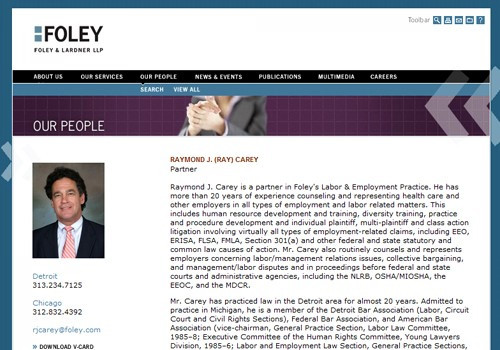Foley sued by partner for age, sex, race discrimination

A partner at Foley & Lardner has sued the firm for discrimination and breach of contract, citing in his complaint that the firm treated younger, female and/or non-white employees more favorably.
Raymond J. Carey is a 57-year old partner in Foley's Labor & Employment Practice. He has more than 20 years of experience counseling and representing health care and other employers in all types of employment and labor related matters. He also was the founding partner of Foley's Detroit office.
However, Carey is currently displeased with the way Foley has been treating him, the Am Law Daily reported. In the complaint filed, Carey said it is an action for discrimination on account of gender, race and age. The complaint, filed in the U.S. District Court Eastern District of Michigan, Southern Division, alleges breach of contract, promissory estoppel, fraudulent misrepresentation, conversion, unjust enrichment, gender discrimination, race discrimination, age discrimination, and violation of the Equal Pay Act.
Carey has complained that the firm had misled him about his partnership status and disrupted his client relationships and later when he had brought up the issue with the firm, it discriminated against him by paying him poorly and failing to follow through on its compensation promises.
The complaint states that Carey was working in a different law firm in Detroit when Foley approached him with an offer in the summer of 2000. Carey said he had initially rejected the offer but Foley jeopardized his relationship with his earlier employer by putting up his profile on its website and associating him with the firm. As a result, he had no option but to switch firms.
Carey also said Foley had promised him that he would be made a full partner within four months at the time he joined Foley as a contract partner. The firm also guaranteed a minimum amount of monthly and annual compensation and promised that the compensation would increase annually based on productivity.
However, Foley reneged on its promise, Carey said, and not only denied him full partnership at the firm but also jeopardized his client relationships by unilaterally reassigning and reallocating billing and supervisory credit that was rightfully his to other partners. The firm, Carey complained, also reprimanded him for the mistakes made by other partners and didn't give him a chance to defend himself.
Carey said Foley never showed him the written copy of the partnership agreement and in 2004 when he signed an agreement under duress (Carey said he was threatened with termination of employment), he was only handed over the signature pages.
The complaint stated that later Carey managed to get his hands on the photocopy of the partnership agreement (thanks to the intervention of a fellow partner at Detroit office) but when he read it, the agreement contained terms and conditions which, he said, he would have never agreed to in the first place.
Carey said Foley does not operate as a true partnership as the the firm's management committee sees itself as an employer and the partners as employees.
Since at least October 2000, the business, financial and human resource functions and compensation practices of Foley, among other functions, have been controlled by a Management Committee, the members of which have not been selected by the partners of the firm, but instead have been appointed by its own members, the complaint states.
Foley's partners, the complaint continues, also have not been elected to partnership by other partners (as is the norm), but instead have been appointed by the Management Committee.
The complaint further states that Carey was given among the lowest compensations handed out to the firm's partners at Detroit office despite the number of years he has served the firm and his compensations during the period 2005 till 2010 were lower than similarly situated female, non Caucasian and younger partners of [Foley] who were no more than equally but actually less qualified.
The gross disparity in his compensation, Carey said, existed despite he fulfilled his billing requirements and generated revenue for the firm that exceeded or was at least equal to (other partners') personal productivity.
Carey said Foley indulged in discriminatory, subjectively determined and arbitrary and capricious compensation practices instead of paying him the guaranteed, minimum monthly and annual compensation to which the firm had agreed. The breach, Carey said, had adversely affected him since October 2000 and has caused him financial distress, mental and emotional distress, embarrassment and humiliation and damage to his reputation among his peers.
The complaint said he has also incurred economic damages in an amount in excess of $75,000 as a direct and proximate result of (Foley's) breach of contract.
Carey is seeking, among other things, economic damages in the form of back pay, liquidated damages, compensatory damages, exemplary and punitive damages and an injunction to prohibit Foley from committing further breaches of his contractual and civil rights.
© Copyright IBTimes 2024. All rights reserved.





















